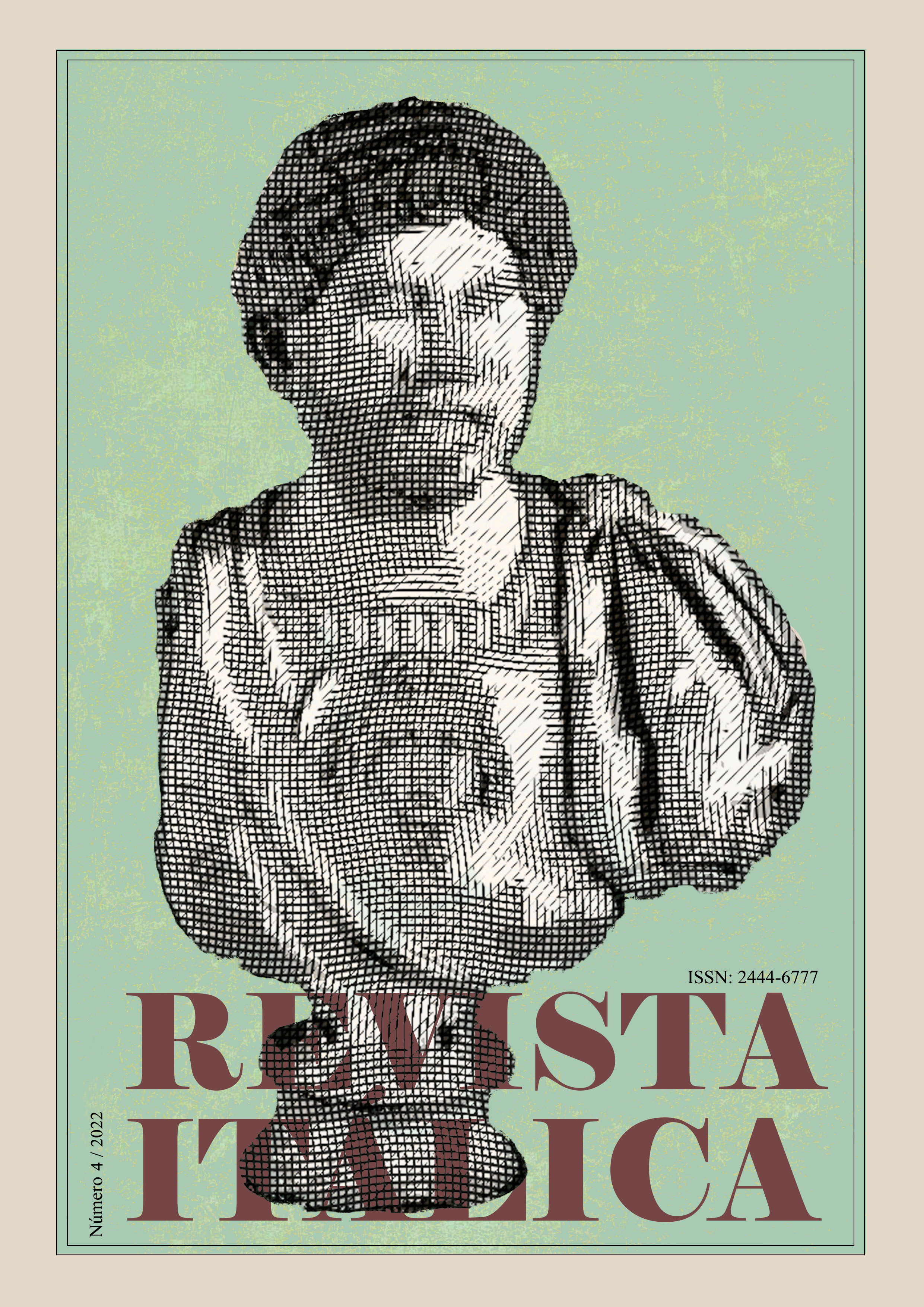Religion in the Greek novel: An analysis of Xenophon of Ephesus’ Ephesian Tale
Keywords:
Xenophon, Ephesian Tale, Ephesus, Greek novel, Religion, procession, sacrifice, oraclesAbstract
This work focuses on the analysis of the religious component of the Ephesian Tale, a Greek novel written by Xenophon of Ephesus around the second century AD. The study is organised around three main blocks: the procession, the sacrifice and the oracles. Thus, each of the passages in which explicit or implicit reference is made to this type of ritual practice is analysed.
Hence, the main objective of this study is to expose how religion within Xenophon's novel has a fundamental role that influences not only stylistically, but also argumentatively.
Downloads
References
BIERL, A. (2013): “Introduction”, en M. P. Futre, A. Bierl y R. Beck (eds.), Intende, Lector - Echoes of Myth, Religion and Ritual in the Ancient Novel, Berlin, De Gruyter, pp. 1-4.
BONNECHERE, P. (2007): “Divination”, en D. Ogden (ed.), A companion to Greek Religion. Malden, Blackwell publishing, pp.145-159.
BOWIE, A. (1995): “Greek sacrifice: forms and functions”, en A. Powell (ed.), The Greek world, Nueva York, Routledge, pp. 463-482.
BREMMER, J. N. (2007): “Greek normative animal sacrifice”, en D. Orgen (ed.), A companion to Greek religion, Malden, Blackwell, pp. 132-144.
BRUIT, L, y SCHMITT, P. (2002): La religión griega en la polis de la época clásica, (Trad. M. F. Díez Platas), Madrid, Akal.
BURKERT, W. (1991): Religión griega arcaica y clásica, (Trad. H. Bernabé). Madrid, Abada.
CHANIOTIS, A. (2011): “Emotional Community through Ritual. Initiates, Citizens, and Pilgrims as Emotional Communities in the Greek World”, en A. Chaniotis (ed.), Ritual Dynamics in the Ancient Mediterranean: Agency, Emotion, Gender, Representation. Stuttgart, Steiner Verlag, pp. 264-290.
EASON, C. (2009): Nuevos misterios del Antiguo Egipto, (Trad. E. Gandía) Barcelona,
Robinbook.
FARNELL, L. R. (1977). The cults of the Greek states vol. V, Nueva York, Caratzas brothers.
GORDON, R. (2015): Apis. Disponible en: https://www.oxfordreference.com/view/10.1093/acref/9780199545568.001.0001/acref-9780199545568-e-586?rskey=yOrbQE&result=1
HERNÁNDEZ, D. (2008): Oráculos griegos, Madrid, Alianza.
MACLEAN, G. (1991): The sacred identity of Ephesos. Foundation myths of a Roman city, Londres y Nueva York, Routledge.
MASON, C. (2006): “The nuptial ceremony of Ancient Greece and the articulation of male control through ritual”, Classics Honors Projects (5). Disponible en:
MERKELBACK, R. (1962): Roman und Mysterium in der Antike. Berlin, C.H. Beck.
NAIDEN, F. (2015): “Sacrifice”, en E. Eidinow y J. Kindt (eds.), The Oxford handbook of ancient Greek religion, Oxford, Oxford University Press, pp. 463-474.
NILSSON, M. P. (1906): Griechische Feste von religiöser Bedeutung, mit Ausschluss der
Attischen, Leipzig, B. G. Teubner Verlag. Disponible en:
https://archive.org/details/griechischefest01nilsgoog.
O'SULLIVAN, J. N. (1995): Xenophon of Ephesus his compositional technique and the birth novel, Berlín, De Gruyter. Disponible en: https://ebookcentral.proquest.com/lib/bupoebooks/detail.action?docID=3044215.
PARKER, R. (2016): “Seeking advice from Zeus at Dodona”, Greece and Rome, 63(1), pp. 69-90.
ROJAS, M. D. (2014): “Aspectos de la religión en la novela erótica griega”, Nóesis: Revista de Ciencias Sociales y Humanidades, 3(45), 140-176. Disponible en: http://erevistas.uacj.mx/ojs/index.php/noesis/index?s=Aspectos+de+la+religi%C3%B
n+en+la+novela+er%C3%B3tica+griega
STONEMAN, R. (2011): The ancient oracles: making the Gods speak, New Haven y Londres, Yale University Press.
SUÁREZ, E. y E. PÉREZ, (2013): “Love, Mysteries and Literary Tradition: New Experiences and Old Frames”, en: R. Beck, A. B. Bierl & M. F. Pinheiro (eds.), Intende, Lector - Echoes of Myth, Religion and Ritual in the Ancient Novel, Berlin, De Gruyter, pp. 51-66.
ThesCRA. (2004): Thesaurus cultus et rituum antiquorum). I. Processions, sacrifices, libation, fumigations, dedications, Los Ángeles: The J. Paul Getty Museum, Basel, Fondation pour le Lexicon Iconographicum Mythologiae Classicae LIMC.
TUÑÓN, J. (1979): “Introducción”, Efesíacas, Madrid, Gredos, pp. 217-229.
WHITMARSH, T. (2008): “Introduction”, en T. Whitmarsh (ed.), The Cambridge companion to the Greek and Roman novel, Cambridge, Cambridge University Press, pp. 1-14.
ZEITLIN, F. (2008): “Religion”, en T. Whitmarsh (ed.), The Cambridge companion to the Greek and Roman novel, Cambridge, Cambridge University Press, pp. 91-108.
Fuentes primarias:
HOMERO. (1978): Himnos Homéricos: La Batracomiomaquia, (Trad. A. Bernabé), Madrid, Gredos.
HOMERO. (1993): Odisea, (Trad. J. M. Pabón), Madrid, Gredos.
JENOFONTE. (1979): Efesíacas, (Trad. J. Mendoza), Madrid, Gredos.

Downloads
Published
How to Cite
Issue
Section
License
1. Authors retain copyright and grant the journal the right to be the first to publish the work and to do so under a "Creative Commons Attribution-NonCommercial 3.0 Spain" (CC-by-nc-sa) licence, unless otherwise indicated.
2. This licence allows others to share, copy, distribute and publicly communicate the work, as well as to make derivative works as long as the work is attributed to the author(s), is not used for commercial purposes and is shared under the same licence.
You can consult the informative version and the legal text of the licence here. This must be expressly stated in this way when necessary.
3. Authors may separately enter into additional agreements for the non-exclusive distribution of the version of the work published in the journal (e.g. placing it in an institutional repository or publishing it in a book), with an acknowledgement of its initial publication in this journal.
4. Authors are allowed and encouraged to disseminate their work electronically (e.g., in institutional repositories or on their own website) before and during the submission process, as it may lead to productive exchanges, as well as earlier and higher citation of published work (see The Effect of Open Access).

 Universidad Pablo de Olavide
Universidad Pablo de Olavide